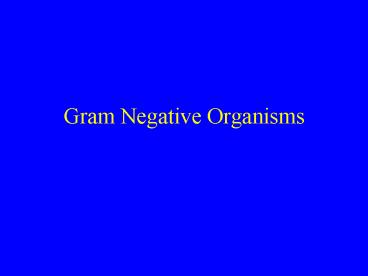Gram Negative Organisms - PowerPoint PPT Presentation
1 / 19
Title:
Gram Negative Organisms
Description:
At least 13 serotypes but B, C common in this country. Based on capsular polysaccharide ... Antimicrobial resistance - intrinsic and acquired. Diseases ... – PowerPoint PPT presentation
Number of Views:394
Avg rating:3.0/5.0
Title: Gram Negative Organisms
1
Gram Negative Organisms
2
2094
3
2096
4
Classification
- Gram negative cocci
- aerobic vs anaerobic
- Gram negative bacilli
- aerobic vs anaerobic
5
Pathogenic mechanisms
- Capsule
- Cell wall
- Endotoxin - lipopolysaccharide
- Adherence mechanisms
- Flagella - motility
- Exotoxins
6
Gram negative cocci
- Aerobic
- Neisseriaceae
- Neisseria spp.
- Moraxella spp
- Anaerobic
- Veillonellaceae
- Veillonella spp.
7
Gram negative bacilli
- Aerobic
- Pseudomonaceae
- Legionellaceae
- Brucella spp., Bordetella spp
- Microaerophilic
- Spirillaceae
- Campylobacter spp., Helicobacter spp.
- Facultatively anaerobic
- Enterobacteriaceae
- Vibrionaceae e.g V. cholerae
- Anaerobic
- Bacteroides spp.
8
Neisseriaceae
- Gram negative diplococci (kidney shaped pairs)
- Fastidious
- N. meningitidis
- N. gonorrhoea
9
N. meningitidis
- At least 13 serotypes but B, C common in this
country - Based on capsular polysaccharide
- Nasopharyngeal colonisation
- Bacteraemia septicaemia
- Meningitis
- Clinical suspicion essential part of diagnosis
10
Enterobacteriaceae
- Obligate pathogens
- Salmonella spp - S. typhi, S. paratyphi,
- Shigella spp - S. sonnei, S. boydii,
- Yersinia spp - Y. pestis
- Facultative pathogens
- Escherichia coli, Klebsiella spp., Proteus spp.,
Enterobacter spp., Serratia spp., Morganella
spp., Citrobacter spp., Providencia spp.
11
Differentiation
- Gram stain - not helpful
- Motility
- Metabolic properties
- Lactose fermentation
- E. coli Vs Salmonella spp.
12
Salmonella spp. and Shigella spp
- Salmonella spp.
- Motile non-lactose fermenting GNB
- S. typhi / S. paratyphi more invasive
- 60 serotypes
- Shigella spp. - dysentery
- non motile, non encapsulate, non lactose
fermenting - 40 serotypes
13
E. coli
- Motile/non-motile GNB, lactose fermenting
- Common cause of infection
- UTI, bacteraemia, meningitis, intra-abdominal
sepsis, - Enteric infection e.g. Travellers diarrhoea,
childhood diarrhoea, Haemolytic Uraemic Syndrome
(E. coli O157),
14
Pseudomonas aeruginosa
- Aerobic, motile GNB
- Oxidises rather than ferments carbohydrates
- Widely distributed - moist environment
- Antimicrobial resistance - intrinsic and acquired
- Diseases
- respiratory tract infection (cystic fibrosis,
ventilated patients), bacteraemia
(immunocompromised patients)
15
Fastidious GNB
- Haemophilus influenzae
- Legionella pneumophila - Legionnaires
- Brucella spp - Brucellosis
- Bordetella pertussis - Whooping cough
- Franciella tularensis - Tularaemia
- Pasteurella spp - wound infection, meningitis
- Yersinia spp. - Plague
16
H. influenzae
- Small non-motile
- Capsulated - 6 distinct types
- Requires supplementation for growth
- X and V i.e. protoporphyrins and nicotinamide
adenine dinucleotide - Diseases
- Bacteraemia, meningitis, epiglottitis, pneumonia,
exacerbations of chronic obstructive pulmonary
disease - vaccination - H. influenzae type B
17
Campylobacter spp.
- Zoonosis
- motile, non spore forming comma shaped GNB
- Microaerophilic
- Need selective techniques to isolate in
laboratory and takes upto 48 hours - Diseases
- gastrointestinal symptoms
- systemic infection
18
Non-spore forming anaerobes
- Gram negative cocci
- Veillonella spp
- Gram negative bacilli
- Bacteroides spp.
- Fusobacterium spp.
19
Other gram negatives - not normally classified
this way
- Spirochaetiaceae
- Treponema - T. pallidum Syphilis
- Borrelia - B. recurrentis Relapsing fever, B.
burgdorferi Lyme Disease - Leptospira - L. icterohaemorrhagiae Weils
disease - Rickettsiaceae
- Short coccoid gram negative rods
- Obligate intracellular bacteria
- R. prowazeki epidemic spotted fever (typhus)
- R. typhi murine spotted fever
- R. rickettsii Rocky mountain spotted fever































